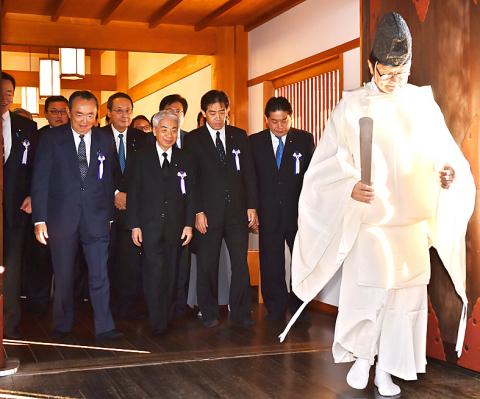Japanese Prime Minister Shinzo Abe sent a ritual offering to Tokyo’s Yasukuni Shrine yesterday, prompting sharp rebukes from China and South Korea, even as Abe seeks meetings with their leaders to improve strained ties.
The shrine, which honors 30,304 Taiwanese who died in World War II among 2.5 million other war dead, is seen by critics such as China and South Korea as a symbol of Japan’s past militarism, because it honors wartime leaders convicted by an Allied tribunal as war criminals, along with millions of war dead.
A group of Japanese lawmakers paid their respects at the shrine yesterday, the beginning of an autumn festival, while Abe sent a small masakaki tree, witnesses said.

Photo: AFP
There was no sign of Cabinet ministers, although NHK public television said Japanese Minister of Health Yasuhisa Shiozaki sent an offering. A ruling party lawmaker tweeted that three ministers planned to visit today.
China expressed “serious concern” after Abe’s offering.
“China reiterates that only by Japan earnestly and squarely facing, deeply reflecting upon its history of invasion and clearly distancing itself from militarism, can China-Japan relations realize healthy and stable development,” Chinese Ministry of Foreign Affairs spokesman Hong Lei (洪磊) said in a statement.
South Korea said it deplored Abe’s offering to the shrine, which it called “the symbol of glorification of Japan’s colonization and invasive war.”
“Japan should move forward to a bright future based on serious reflection on the past, not locking itself in the dark past,” a South Korean Ministry of Foreign Affairs spokesman said.
Expectations have been growing that Abe will be able to meet Xi for icebreaking talks next month at an APEC summit in Beijing.

AGING: As of last month, people aged 65 or older accounted for 20.06 percent of the total population and the number of couples who got married fell by 18,685 from 2024 Taiwan has surpassed South Korea as the country least willing to have children, with an annual crude birthrate of 4.62 per 1,000 people, Ministry of the Interior data showed yesterday. The nation was previously ranked the second-lowest country in terms of total fertility rate, or the average number of children a woman has in her lifetime. However, South Korea’s fertility rate began to recover from 2023, with total fertility rate rising from 0.72 and estimated to reach 0.82 to 0.85 by last year, and the crude birthrate projected at 6.7 per 1,000 people. Japan’s crude birthrate was projected to fall below six,

US President Donald Trump in an interview with the New York Times published on Thursday said that “it’s up to” Chinese President Xi Jinping (習近平) what China does on Taiwan, but that he would be “very unhappy” with a change in the “status quo.” “He [Xi] considers it to be a part of China, and that’s up to him what he’s going to be doing, but I’ve expressed to him that I would be very unhappy if he did that, and I don’t think he’ll do that. I hope he doesn’t do that,” Trump said. Trump made the comments in the context

SELF-DEFENSE: Tokyo has accelerated its spending goal and its defense minister said the nation needs to discuss whether it should develop nuclear-powered submarines China is ramping up objections to what it sees as Japan’s desire to acquire nuclear weapons, despite Tokyo’s longstanding renunciation of such arms, deepening another fissure in the two neighbors’ increasingly tense ties. In what appears to be a concerted effort, China’s foreign and defense ministries issued statements on Thursday condemning alleged remilitarism efforts by Tokyo. The remarks came as two of the country’s top think tanks jointly issued a 29-page report framing actions by “right-wing forces” in Japan as posing a “serious threat” to world peace. While that report did not define “right-wing forces,” the Chinese Ministry of Foreign Affairs was

PREPAREDNESS: Given the difficulty of importing ammunition during wartime, the Ministry of National Defense said it would prioritize ‘coproduction’ partnerships A newly formed unit of the Marine Corps tasked with land-based security operations has recently replaced its aging, domestically produced rifles with more advanced, US-made M4A1 rifles, a source said yesterday. The unnamed source familiar with the matter said the First Security Battalion of the Marine Corps’ Air Defense and Base Guard Group has replaced its older T65K2 rifles, which have been in service since the late 1980s, with the newly received M4A1s. The source did not say exactly when the upgrade took place or how many M4A1s were issued to the battalion. The confirmation came after Chinese-language media reported